Maersk Line commits to cut 20% CO2 for every Philips container
Maersk Line announced that both Philips and Maersk Line commit to cut 20% for every Philips container moved confirming their mutual values and ambitions for achieving sustainable growth in a 5-year Carbon Pact.Focus on progress and innovation Philips understands that sustainable development is one of the most challenging issues facing the world. Therefore, Philips is engaging suppliers to create awareness of sustainability topics and encourage them to increase environmental performance. “Philips believes the transition from a linear to a circular economy is an essential boundary condition to create a sustainable world. It is a driver of innovation in the areas of materials, components, product re-use, and not unimportantly logistics. Therefore, continued focus on reducing our environmental impact from logistics is required.” says Arjan de Jongste, Senior Vice President Procurement Indirect Materials & Services at Royal Philips.With this in mind, and Philips’ mission to create a more sustainable world through innovation, the two parties have signed a five-year strategic Carbon Pact. The agreement integrates both companies’ longstanding commitments to reduce carbon dioxide (CO2) emissions within their value chain by 2020. The CO2 reductions are to be achieved over a 5-year time frame between 2016 and 2020 and will focus closely on reducing emissions ...
Read moreDetails


















































